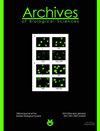伊拉克人群瘦素基因单核苷酸多态性rs11761556和rs12706832与2型糖尿病相关
IF 0.8
4区 生物学
Q4 BIOLOGY
引用次数: 6
摘要
本研究旨在评估伊拉克瘦素(LEP)基因多态性与2型糖尿病(T2DM)之间的潜在关联。从120名糖尿病患者和100名对照组中提取基因组DNA。设计了3个特异性PCR片段,对LEP中rs11761556、rs12706832和rs2167270三个高频率单核苷酸多态性(SNP)进行定位。对扩增的基因座进行pcr -单链构象多态性(SSCP)分型,并对代表性基因型进行Sanger测序。采用Logistic回归分析检测目标基因变异与T2DM之间的关系。PCR-SSCP基因分型显示这三个目标snp有三种带型。rs11761556和rs12706832 snp中AA基因型个体的体重指数(BMI)、腰围(WC)、空腹血糖(FBG)、血红蛋白A1c (HbA1c)、胰岛素抵抗稳态模型评估(HOMA-IR)、胰岛素、低密度脂蛋白胆固醇(LDL-C)和甘油三酯(TG)值均显著高于其他基因型个体(P<0.05)。关联分析显示,携带A等位基因的个体患2型糖尿病的风险更高。本研究的数据表明rs11761556和rs12706832 snp与T2DM具有显著的相关性。本研究建议在T2DM的早期检测中同时使用rs11761556和rs12706832 snp。本文章由计算机程序翻译,如有差异,请以英文原文为准。
The single nucleotide polymorphisms rs11761556 and rs12706832 of the leptin gene are associated with type 2 diabetes mellitus in the Iraqi population
This study was conducted to assess the potential association between leptin (LEP) gene polymorphisms and type 2 diabetes mellitus (T2DM) in Iraqi patients. Genomic DNA was extracted from 120 diabetic subjects and 100 controls. Three specific PCR fragments were designed to flank three highly frequent single nucleotide polymorphism (SNP)s within LEP, rs11761556, rs12706832 and rs2167270. The amplified loci were genotyped by PCR-single-strand conformation polymorphism (SSCP) followed by Sanger sequencing for representative genotypes. Logistic regression analysis was performed to detect the association between the targeted genetic variants and T2DM. PCR-SSCP genotyping showed three banding patterns for all three targeted SNPs. Individuals with the AA genotype in both rs11761556 and rs12706832 SNPs showed significantly higher (P<0.05) body mass index (BMI), waist circumference (WC), fasting blood glucose (FBG), hemoglobin A1c (HbA1c), homeostatic model assessment for insulin resistance (HOMA-IR), insulin, low-density lipoprotein cholesterol (LDL-C) and triglyceride (TG) values than those with other genotypes. Association analysis revealed that individuals with the A allele exhibited a greater risk of T2DM. Data of the present investigation indicated that both rs11761556 and rs12706832 SNPs exerted a noticeable association with T2DM. The study suggests implementing both rs11761556 and rs12706832 SNPs in the early detection of T2DM.
求助全文
通过发布文献求助,成功后即可免费获取论文全文。
去求助
来源期刊
CiteScore
1.40
自引率
0.00%
发文量
25
审稿时长
3-8 weeks
期刊介绍:
The Archives of Biological Sciences is a multidisciplinary journal that covers original research in a wide range of subjects in life science, including biology, ecology, human biology and biomedical research.
The Archives of Biological Sciences features articles in genetics, botany and zoology (including higher and lower terrestrial and aquatic plants and animals, prokaryote biology, algology, mycology, entomology, etc.); biological systematics; evolution; biochemistry, molecular and cell biology, including all aspects of normal cell functioning, from embryonic to differentiated tissues and in different pathological states; physiology, including chronobiology, thermal biology, cryobiology; radiobiology; neurobiology; immunology, including human immunology; human biology, including the biological basis of specific human pathologies and disease management.

 求助内容:
求助内容: 应助结果提醒方式:
应助结果提醒方式:


